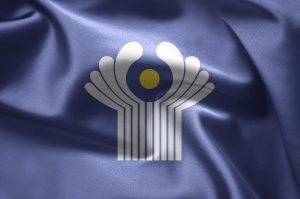Russian President Vladimir Putin is marking his 70th birthday on October 7 huddling with the leaders of the Commonwealth of Independent States at an informal meeting in St. Petersburg. The leaders of Armenia, Belarus, Kazakhstan, Tajikistan and Uzbekistan have all been reported as attending the meeting in Russia.
The president of Kyrgyzstan, Sadyr Japarov, has specifically been reported as not attending. Though no official reason has been given, on October 4 Putin signed a decree awarding Tajik President Emomali Rahmon the Order of Merit for the Fatherland, 3rd class, for strengthening the Russia-Tajikistan strategic partnership and “ensuring regional stability and security.” Rahmon, whose 70th birthday was October 5, is expected to receive the award during the CIS gathering. Kyrgyz authorities made clear their displeasure at the award, with foreign ministry press secretary Chingiz Kustebaev posting on Facebook: “It is interesting what kind of regional security one can talk about when from year to year the actions of the Tajik leadership in the region undermine peace and harmony among the peoples of the countries of Central Asia.”
It’s also not clear if the leaders of Azerbaijan or Moldova will attend the CIS gathering in St. Petersburg. Azerbaijan’s President Ilham Aliyev and Armenian Prime Minister Nikol Pashinyan met with French President Emanuel Macron and EU met on the sidelines of the first European Political Community summit in Prague, Czechia, on October 6. The two leaders, whose states are in the grips of serious tension amid a recent resumption of violence, also met with Turkish President Recep Tayyip Erdogan. Pashinyan was reported as flying on to St. Petersburg, but it’s not clear if Aliyev has made the trip too.
What does it matter who attends the informal CIS summit in St. Petersburg? The attendance list tells us about the current state of the CIS. At a time when Putin is increasingly a pariah on the global stage, the CIS countries are the closest partners Russia has.
As the Soviet Union collapsed, the Commonwealth of Independent States (CIS) rose from its ashes. What began as an agreement between Russia, Belarus and Ukraine — the Belavezha Accords — expanded by the end of December 1991 to include 11 of the 15 Soviet Republics. In December 1993, Georgia joined the CIS, which then covered the entirety of the former Soviet Union’s territory with the exceptions of the Baltic states — Latvia, Lithuania and Estonia — which instead pursued closer relations with Europe and by 2004 NATO membership. Only ten of the states that participated in the CIS creation ratified its charter (Turkmenistan and Ukraine never did) and at present, the commonwealth only counts nine states as members (Armenia, Azerbaijan, Belarus, Kazakhstan, Kyrgyzstan, Moldova, Russia, Tajikistan and Uzbekistan). Ukraine participated as an “associate” until 2018 and Georgia withdrew after the 2008 war with Russia.
Within the CIS, as with the Shanghai Cooperation Organization, are a bevy of tense relationships, particularly Armenia-Azerbaijan and Kyrgyzstan-Tajikistan as noted above. The departure and disassociation of Georgia and Ukraine were both linked to Russian military aggression. Putin’s view of the Soviet collapse as a “genuine tragedy,” informs his approach to the CIS. But member states have largely remained neutral when it comes to the Ukraine conflict, a position which puts them at odds with Putin and Russia. If Putin had hoped the CIS would be a well of loyalty, he may be disappointed. At the same time, despite much chatter about a split, the president of Kazakhstan, Kassym-Jomart Tokayev, is attending the informal meeting. This demonstrates continued hope in Astana for the wider network of CIS relationships, despite Russia’s decision of the past year. Indeed, with Russia diminished, the grouping’s other members may find more room to cooperate on their own terms within the commonwealth.
Either way, with continued news of Russian battlefield losses in Ukraine it won’t be a very happy birthday for Putin.

































